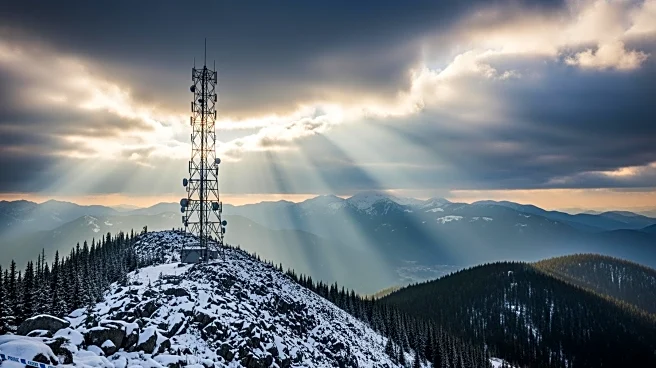What's Happening?
In July 2025, the U.S. Senate voted on a bill to end funding for public media, a move that Republican Senator Lisa Murkowski opposed. During the vote, Murkowski received a text about a major earthquake off the southwest coast of Alaska, followed by tsunami
warnings. She urged her colleagues to preserve federal funding for public media, highlighting its critical role in disseminating emergency information. Despite her efforts, the bill passed, retracting two years of previously appropriated funding. Murkowski, along with Senator Susan Collins, were the only Republicans to oppose the bill. Public media stations like KYUK in Alaska, which provide essential services such as emergency alerts and local news in indigenous languages, face significant challenges due to these funding cuts.
Why It's Important?
Public media plays a vital role in rural and remote areas, particularly in Alaska, where many communities are not connected by road and rely on radio for critical information. The funding cuts threaten the survival of stations that provide emergency alerts, cultural programming, and local news, which are essential for community safety and cohesion. The loss of funding could lead to layoffs and reduced services, impacting the ability of these stations to serve their communities effectively. The decision reflects broader political debates over government spending and the role of public media, with implications for rural connectivity and cultural preservation.
What's Next?
The immediate consequence of the funding cuts is the potential downsizing of public media operations, including layoffs and reduced programming. Senator Murkowski and other advocates may seek alternative funding sources or legislative solutions to support these stations. The impact on local communities could prompt further political and public discourse on the importance of public media, especially in underserved areas. Efforts to secure temporary funding for tribal stations offer a short-term reprieve, but long-term solutions are needed to ensure the sustainability of public media in Alaska and similar regions.
Beyond the Headlines
The funding cuts highlight the cultural and political divide over public media's role in society. Public media stations often serve as cultural hubs, preserving indigenous languages and traditions while providing essential services. The debate over funding reflects broader tensions in U.S. politics, including issues of media bias and government spending priorities. The loss of public media could exacerbate cultural isolation and reduce the diversity of voices in national discourse, impacting how communities are represented and understood across the country.















